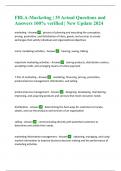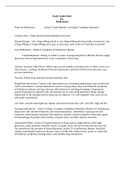Class notes
OCR A level English Lit critics (AO5) table from A* student for The Duchess of Malfi
- Course
- Institution
- Book
Fully comprehensive critics table - gives detail into each of the critics, with dates and references to books, summarising their theses. Helped me achieve an A*, almost full marks, in my A level.
[Show more]







